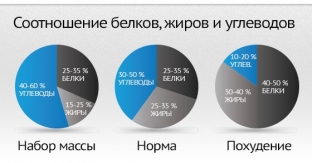We are used to treating them with caution. Moreover, an excess of them in food is considered almost the main dietary crime. Especially from the point of view of those who want to lose weight. Yes, it is: a lot of carbohydrates – poorly. But how would we not overdo it in the persecution of carbohydrates, because they are just as necessary for the health of the body as proteins and fats. And when they are not enough, the body begins to send alarm signals. estet-portal.com will help you recognize them.
Carbohydrates – evil or good?
When going on a diet for weight loss, many people completely refuse carbohydrates, considering them the main culprits of excess weight. But, as is often the case, the truth is somewhere in the middle, and these organics have something to say in their defense. They are, firstly, a source of valuable fiber necessary for the normal functioning of the digestive system. Fiber reduces the risk of gastrointestinal cancer, normalizes blood cholesterol levels. Secondly, they – the same “fuel” that gives us strength: almost 60% of the energy that the body receives is provided by carbohydrates. Glycogen – a vital energy reserve for the body – is also synthesized from them. The work of the brain, heart, nervous system, metabolic processes without them will be very difficult.
Carbohydrates are necessary for the normal functioning of the digestive system and to provide the body with energy.
You just need to clearly understand what is good and what is bad. After all, carbohydrate carbohydrate – strife. There are simple carbohydrates (found in sugar, sweets, some fruits) and complex ones. Simple ones, once in the body, break down almost instantly, raising the level of sugar, and, of course, give energy. BUT! But insulin immediately lowers the level of sugar, and we again want to eat. And if you constantly satisfy your hunger with simple carbohydrates, then they will no longer be absorbed and go into body fat. Here are the extra pounds for you!
Complex carbohydrates (starch, pectins, fiber), whose task is also to provide the body with energy, work differently: being digested slowly, they give a long feeling of satiety. They are rich in whole grain bread, potatoes, pasta, legumes, corn, fruits, cereals.
How many carbs do you need per day?
Nutritionists determine the following daily rate of carbohydrates for a healthy, not prone to overweight person: 50-60% of the daily diet. Simple carbohydrates should not be ignored either (honey, for example, also contains them), but they should be no more than a third. If you have a sin of gluttony, then you need to be careful with carbohydrates: no more than 100 g per day. Those who are losing weight should limit themselves to carbohydrates, but not give them up altogether: 30-50 g per day on your plate must be! A long-term diet with a lack of this important organic substance for a person is fraught with health problems.

How the body signals a lack of carbohydrates
Limiting myself to potatoes, pasta, cereals, vegetables, fruits, you may soon encounter the following problems:
- Chronic fatigue, difficulty concentrating. The body needs energy – it's an axiom. Not getting it from carbohydrates, he begins to work hard to "carve a spark"; from proteins and fats. The occupation is labor-intensive, therefore, even with an 8-hour sleep, we feel tired, sleepy. Problems with memory and concentration begin. Zero mood. Often, to improve it, we reach for the “feel good hormone”; - candy-chocolate. Bottom line: extra pounds.
- Weight fluctuations. The body reacts to the lack of carbohydrates in the diet first by weight loss (in fact, fluid is excreted from the body). However, when the concentration of sugar in the blood rises, insulin will take over, which is responsible, among other things, for the accumulation of fat reserves. And the excess weight will return again.
- Headaches. The reason is a decrease in blood sugar levels. When the body switches from burning glucose to using fat reserves, we may also feel irritated, weak, and dizzy. And you can also crave sweets. And although it is difficult to imagine that the lack of sugar is associated with a lack of carbohydrates, but it is true.
The lack of carbohydrates can also affect the mood, because it is from them that the happy hormone serotonin is synthesized.
- Lack of strength. You get tired quickly, is it a problem for you to master even one flight of stairs or run 10 meters to the bus? Reason – again in an unbalanced diet.
- Constant feeling of hunger, chills. Cold hands, feet and an everlasting desire to chew something – wine diet with a lack of carbohydrates. Expect irritability (again, lack of serotonin), various ailments.
- Bad breath. Bad breath – a side effect of a high-fat diet. Salvation – in enriching the diet with cereals, vegetables. You also need to drink plenty of clean water.
- Constipation. Lack of fiber complicates the work of the gastrointestinal tract. The introduction of vegetables and fruits into the diet will save the day.
Balanced diet – one of the cornerstones of good health, and it is not worth completely eliminating healthy foods from it.






Add a comment